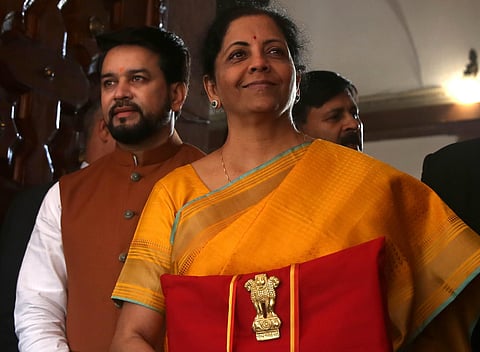

Finance Minister Nirmala Sitharaman’s much-awaited Budget succeeded in disappointing the stock markets, economic pundits and the common man as it neither delivered the reforms to revive the economy nor put money in the pockets of the masses. Economists had been urging the government to spend big on social, rural and infrastructure sectors to create jobs and demand for goods, which could, in turn, bolster the slowing economy.
However, the Budget shows the government's total expenditure will go up only a modest 9 per cent in 2020-21. The increase ranges from 2.14 per cent to 6 per cent for vital growth sectors such as agriculture, rural development to social welfare.
With retail inflation ranging over 7 per cent in December, this could mean a negative growth in outlay in many sectors. "What we find is a Budget long on speech and short on substance," said M Govinda Rao, former member, PM’s Economic Advisory Council. "We do not see either consumption or investment demand reviving with this Budget," he added.
Low consumer demand has seen India’s factories idle away more than a quarter of their production capacities. Annual bank credit growth, too, has moderated from 12.9 per cent in April 2019 to just 7.1 per cent as on December 20, 2019.
"The Budget doesn’t seem to have a clear vision to resolve the economic crisis. While we need a capital spending of Rs 25 lakh crore a year, the government’s capital outlay is just Rs 4.12 lakh crore," said Arun Kumar, Malcolm Adiseshiah Chair, Institute of Social Sciences, New Delhi.
Although the government promised an optional new personal income tax regime, which could notionally cost it Rs 40,000 crore by way of forgone taxes, analysts said most tax-payers may prefer the older tax structure.
ALSO READ: Budget with 20:20 vision for future
The re-jigged tax slabs and seemingly reduced taxes in the new voluntary tax regime come with caveats that make taxpayers ineligible for a long list of exemptions including standard deduction and tax set-offs for long term savings, insurance, etc. Analysts believe this could mean taxpayers would, in most cases, lose out by migrating to the new regime.
This, despite the FM promising at the beginning of her speech that the Budget is to boost people’s income and enhance their purchasing power. While the government promised to raise the insurance cover on bank deposits from Rs 1 lakh to Rs 5 lakh, it might not impress many as it comes amid coop bank collapses.
ALSO READ: A speech that leaves the economy wondering
Top officials pointed out that Sitharaman was possibly constrained by the fact that India’s public debt has been rising, putting pressure on public finances by way of increased interest payment, slated to go up from Rs 5.82 lakh crore in 2018-19 to Rs 7.08 lakh crore in 2020-21. "Even with these figures, the fiscal deficit is being relaxed by a half-a-per cent to 3.5 per cent of GDP," said the officials, adding "More relaxations beyond the FRBM Act could reduce India’s sovereign debt rating globally."
The government also doubled its disinvestment target to Rs 2.1 lakh crore by promising to sell shares of the state-run Life Insurance Corporation. Many analysts believe even the relaxed fiscal deficit target is difficult to meet given the continuing trend of shortfalls in tax and other revenue streams.
Longest Budget speech
FM Nirmala Sitharaman cut short her Budget speech in the Lok Sabha that had already gone on for a record 160 minutes, as she felt unwell. Two pages of her speech were left unread. She broke her own record of 137 minutes set in the July 2019 budget speech.